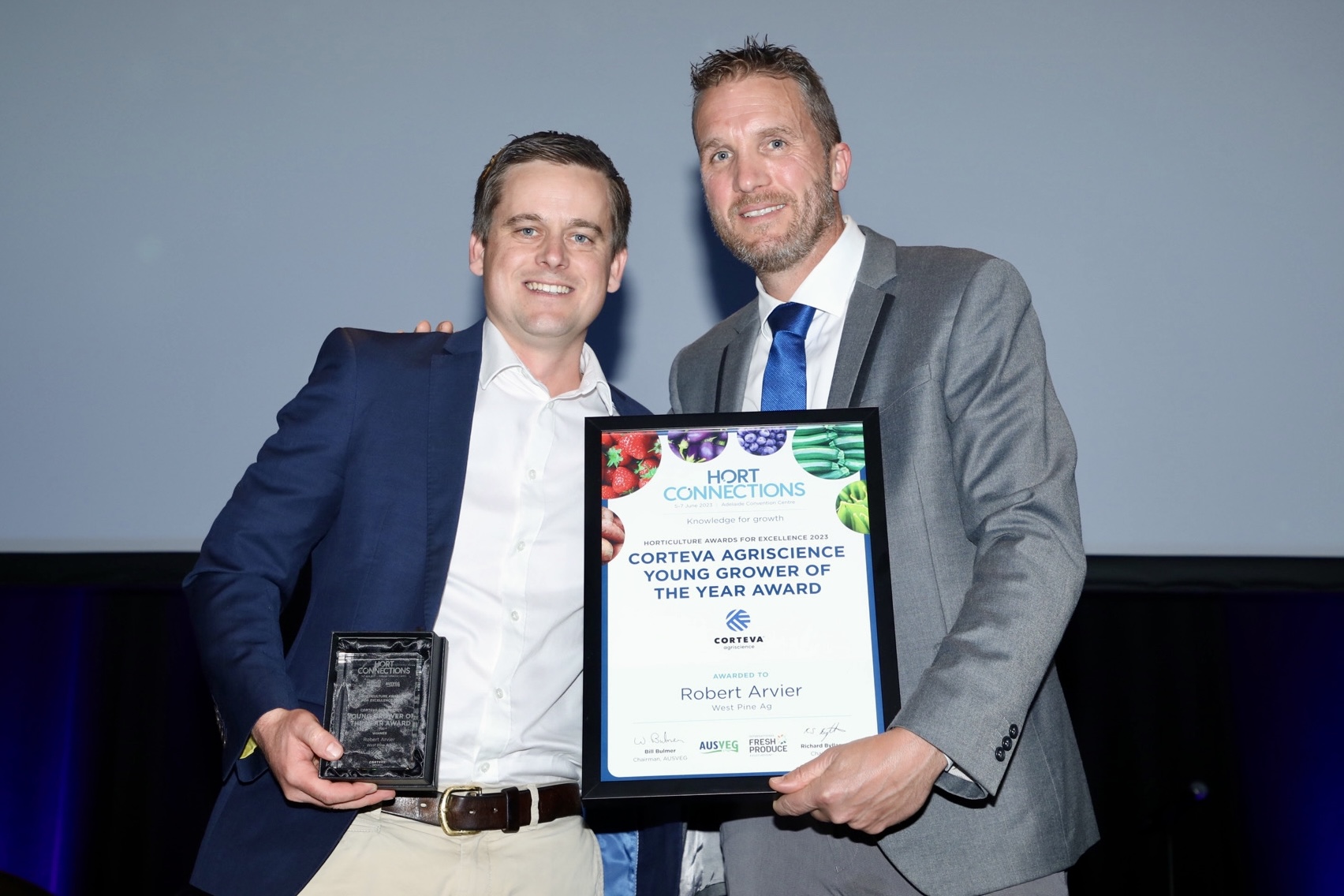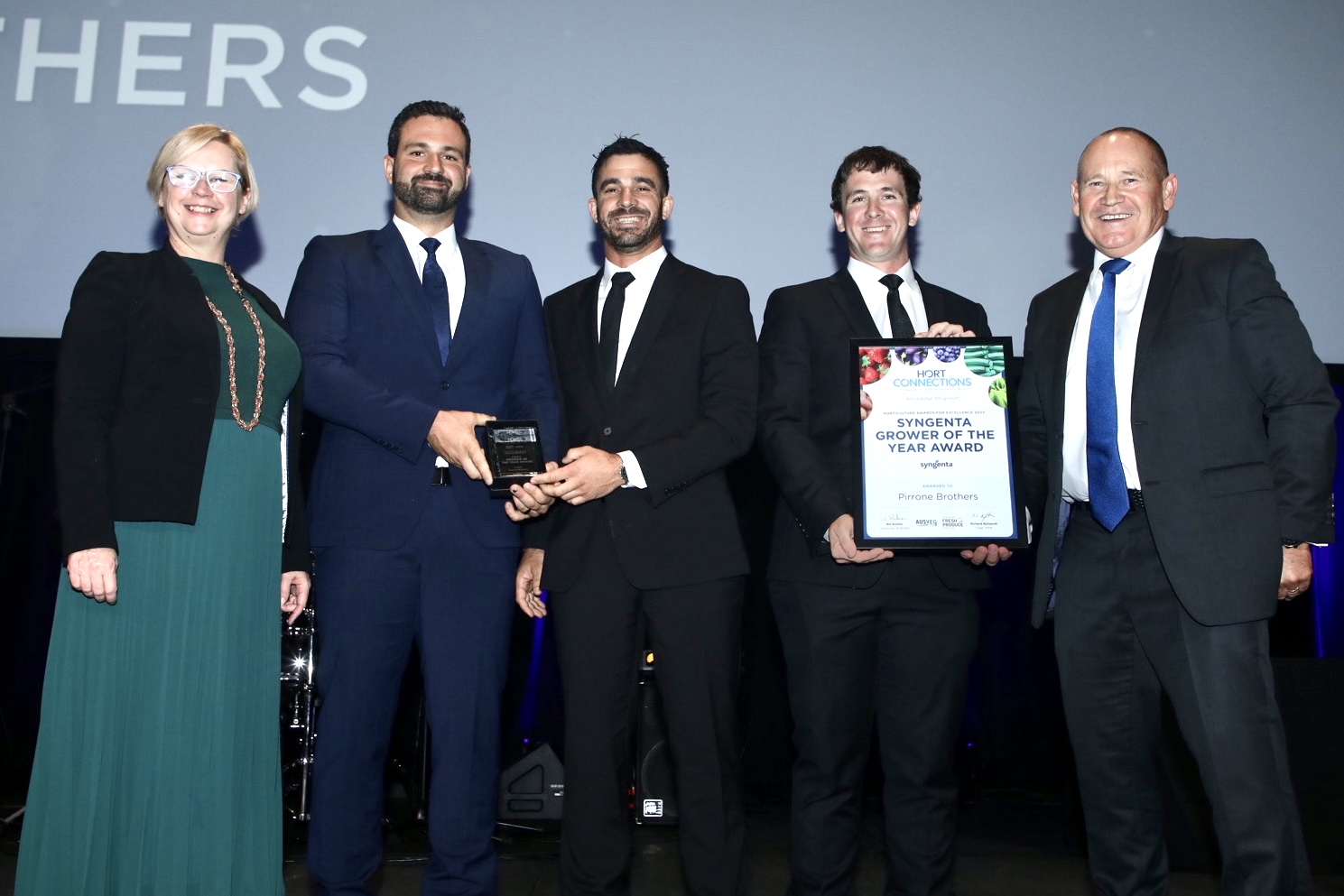
Hort Connections 2023 Young Grower of the Year
28 September 2023ATMAC European Study Tour 2023 introduction video
28 September 2023The inexperience advantage
They started green behind the ears, but that’s now turned to gold as North Queensland growers Pirrone Brothers rack up the awards.
In a farm office near Ayr in North Queensland, there’s a shelf that’s beginning to groan under the weight of all the awards being stacked on top of it.
North Queensland mixed crop operation Pirrone Brothers has been racking up the accolades this year in recognition of the third-generation grower’s rapid pace of innovation and development.
In June, Pirrone Brothers was recognised as the Syngenta Grower of the Year at the Hort Connections 2023 conference in Adelaide. In early July, Production Manager Josh Pirrone was awarded PCA Grower of the Year at the Protected Cropping Australia Conference in Brisbane. Later that same month, Pirrone Brothers was named Fresh Produce Supplier of the Year at the Coles Supplier Awards in Melbourne.
All these well-deserved awards reflect the reputation Pirrone Brothers has built as a pioneer in vegetable production in North Queensland.
While it’s a third-generation business, Pirrone Brothers only delved into vegetable production 10 years ago. After nearly 70 years as a sugarcane farm, vegetables become the primary focus once the new generation of brothers, Ross, Josh and Chris, took over.
“Dad had seen the direction the sugar industry was going, and he didn’t see a stable or enjoyable future in it,” said Business Manager Ross Pirrone.
“He started mucking about with horticulture with the help of a friend that was doing it, growing some pumpkins, while myself and my brothers were out doing our trades,”
The three brothers had made careers for themselves off-farm: Ross as a coal mine diesel mechanic, Josh as a panel beater and Chris as a marine mechanic. As they started to take over the reins to the farm, they started experimenting more and more with vegetables.
“We started slowly, doing a bit of a trial, and we picked up some food service contracts supplying cucumbers and capsicums,” said Ross.
“From there we saw the need for consistent supply, which led us into greenhouses, which then led to me doing a Nuffield Scholarship, which then led to us supplying Coles Supermarkets, which then led to us scaling up.”
The lack of generational vegetable farming experience has made for a steep learning curve, but the Pirrone Brothers have turned it to their advantage, pushing the boundaries of what is possible for vegetable production in the Burdekin region unhindered by entrenched practices or assumptions.
“At the start we had no idea and we approached a few local growers,” Ross explained. “Some were great, and others told us to go away. Funnily enough, they’re the ones who copy what we’re doing now.”
While the brothers did find local mentors who gave them invaluable support in the early days, as one of only a few protected cropping operations in North Queensland they have needed to break a lot of ground. That led to them working closely with the Queensland Department of Agriculture and Fisheries (DAF) on a variety of R&D projects.
“Our situation is different, so we had to work it out for ourselves, and it was just brutal for a good five to seven years of learning everything from the ground up,” said Ross.
“In the last three to five years we’ve started piecing it all together, getting an idea of how we want to do it without the preconceived ideas that people have when they’ve been doing something for a long time.”
Pirrone Brothers’ history has also helped in some areas. After three generations surviving the razor-thin margins of sugarcane growing, the business had a focus on scale, mechanisation and, above all, efficiency that has translated well into vegetable production.
The brothers’ father, Ross-Wayne Pirrone, ran the sugarcane operation with as much self-sufficiency as possible, and the family built and modified machinery themselves to eke out every possible opportunity for efficiency.
“They did everything themselves; they used to joke that the only other thing they could do was start an iron ore mine and make their own steel,” Ross said of his father’s generation.
“That led them to be more successful and efficient, and it set a good foundation with the farm layout and design to be able to scale for horticulture very well.”
The new generation has followed in the same footsteps, with a dedicated fabrication and mechanic workshop on farm employing a full-time welder and a mechanical fitter. The three brothers’ also draw on their original trades and tap into support from extended family members with engineering and computer aided design backgrounds.
The brothers erected their first greenhouse themselves using a 2000 square metre prefabricated kit. The primary aim of the greenhouse was to keep production running when seasonal conditions weren’t suitable for field production, and it has been the home of numerous trials and research projects with DAF since it was built.
“It’s still essentially a research facility that we produce out of,” explained Ross. “It’s our own version of a high-tech glasshouse, because we’re solving the opposite problems of most people with greenhouses. They don’t have enough light; we have too much. They don’t have enough water; we’ve got too much. They don’t have enough heat; we have too much.”
The challenge now is scaling up. Pirrone Brothers is dedicated to sustainable, self-funded growth, rather than relying on external finance to grow quickly, but building new large-scale vegetable production infrastructure and protected cropping capacity comes with a big cost.
“We’ve been building the core infrastructure, whether that’s management or physical packing sheds and cool rooms,” said Ross.
“That’s got to come first, but it’s hard to build that at the same time as scaling indoor production. The scale [of open field cropping] we’ve got already has been pretty fast compared to a lot of growers. We’ve built this up in effectively five years.”
“We have to do it full scale or forget about it. The capital cost is excessive up front, but long term it makes sense.”
Image: The Hon Clare Scriven MLC, the Pirrone Brothers and Syngenta Australia New Zealand Managing Director Paul Luxton

